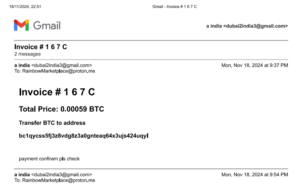Table of Contents
ToggleRAINBOW MARKET – TOR Scam Report (27)
Onion Link : http://rainb7y3rdcwymvkrfa3nbxzu6biwwxfadoir3ahgusraiyn4k7ahmyd.onion/transfer_index.htm
Scam Report Date : 2024-11-18
Client Scam Report Breakdown
Original Scam Report :
The scam report describes a transaction involving Rainbow Marketplace, a platform alleged to facilitate anonymous online commerce. The complainant received an invoice identified as #167C, specifying a total payment of 0.00059 BTC to be transferred to an undisclosed Bitcoin wallet address. The report indicates that the transaction was part of a purchase but does not mention whether the complainant received a confirmation or the promised product or service. This lack of follow-up communication, combined with the anonymous nature of the transaction, strongly suggests fraudulent intent. The involvement of Rainbow Marketplace, reportedly operating in an unregulated environment, raises further concerns about its credibility and practices.
Photos :

Terminology and Definitions in the Context of Fraud
Understanding the terminology in this report is essential to contextualize the scam. Rainbow Marketplace likely refers to an online marketplace, potentially hosted on the dark web, known for anonymity and a lack of oversight. Bitcoin (BTC) is a decentralized cryptocurrency often used for transactions on platforms like this due to its pseudonymous nature, which makes it challenging to trace or reverse payments. The term “Invoice #167C” suggests an organized process meant to mimic legitimate e-commerce operations. However, scammers often generate fake invoices to create a false sense of legitimacy, coercing victims into transferring funds. The Bitcoin wallet address, while not included in the provided report, is a unique identifier for the recipient, enabling funds to be sent securely and anonymously. Without protections like dispute resolution mechanisms, once funds are transferred to a Bitcoin address, they cannot be recovered.
Detailed Analysis and Implications
The scam detailed in the report illustrates common tactics used in fraudulent cryptocurrency transactions. By issuing an invoice and specifying a small Bitcoin payment (0.00059 BTC), the scammer likely aimed to reduce suspicion and increase compliance from the victim. The pseudonymous nature of Bitcoin and the absence of regulations surrounding such transactions create an environment where scammers can operate with impunity. The lack of a recipient address in the report may indicate an intentional omission or an effort to protect personal data while still highlighting fraudulent behavior. The role of [email protected] as the communication channel further signals potential fraud. ProtonMail, known for its strong encryption and anonymity, is often exploited by bad actors for similar scams.
This report highlights critical lessons for users engaging in cryptocurrency transactions. First, platforms operating in unregulated spaces, especially those involving anonymity, carry inherent risks. Second, users should treat Bitcoin payments as irreversible, exercising extreme caution before transferring funds. Finally, the apparent professionalism of the scam, including the issuance of an invoice, showcases the evolving sophistication of fraudulent schemes. Consumers must be vigilant and verify the legitimacy of platforms and their associated payment requests to minimize the risk of falling victim to such scams.






